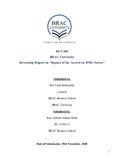| dc.contributor.advisor | Mohiuddin, Md. Fazla | |
| dc.contributor.author | Mitul, Kazi Sabrina Sultana | |
| dc.date.accessioned | 2019-03-03T05:47:35Z | |
| dc.date.available | 2019-03-03T05:47:35Z | |
| dc.date.copyright | 2018 | |
| dc.date.issued | 2018-11-29 | |
| dc.identifier.other | ID 15104112 | |
| dc.identifier.uri | http://hdl.handle.net/10361/11481 | |
| dc.description | This internship report is submitted in partial fulfillment of the requirements for the degree of Bachelor of Business Administration, 2018. | en_US |
| dc.description | Cataloged from PDF version of internship report. | |
| dc.description | Includes bibliographical references (page 31). | |
| dc.description.abstract | The Accord is an independent and legally binding agreement which is designed to ensure safe and
healthy working condition of Ready-Made Garment Factories of Bangladesh. The study represents
the impact of the Accord in the RMG sector of our country and also represents the reasons behind
the establishment of the Accord. The Accord has come into play as a result of numerous hazards
and accidents leading to death and injuries of a large number of garment workers in the previous
years. Moreover, the catastrophic hazard of Rana Plaza had captured the attention of the whole
world and therefore, major brands and retailers started to become really concerned about their
reputation. Additionally, the contribution of ready garment is also discussed in this study since the
impact is very significant in our economy. These ready-made garment factories has created
employment of a large number of people specially women and it is one of the examples of women
empowerment and most importantly has earned foreign currency contributing to the development
of this country (Shoron and Huq, 2014). As a result, the govt. became very concerned when the
Generalized System of Preference (GSP) was suspended and this huge industry was at stake. To
protect this industry immediate measures were taken to ensure safe and healthy working condition
for the garment workers. In response, Bangladesh government adopted National Tripartite Action
Plan with the help of ILO for building and fire safety. Under which factory building were assessed
based on structural integrity, fire and electrical safety with a target of covering 1500 factories.
Even the country’s labor law of 2006 had been amended in 2015. Therefore, 200 retailers of
European, Asian and American buyers signed on the Accord on Fire and Building Safety. The
objective of the Accord is to ensure sustainable and safe garment industry in Bangladesh. As a
result, this study describes the impact and changes brought by the Accord in the ready-made
garments industry in terms of safe and healthy working condition. Moreover, it also represents the
impact on the organization where I am given an opportunity of internship. Overall, the study firstly
represents the reasons behind the introduction of the Accord in our country. Then it discusses about
the processes, programs and practices conducted by the Accord. Thirdly, the study signifies the
impact of the Accord on PDS Multinational Group. Most importantly, it signifies both financial
and non-financial impact of the Accord on RMG sector. Lastly, the study talks about the
“Transition Accord 2018”. | en_US |
| dc.description.statementofresponsibility | Kazi Sabrina Sultana Mitul | |
| dc.format.extent | 31 pages | |
| dc.language.iso | en | en_US |
| dc.publisher | BRAC University | en_US |
| dc.rights | BRAC University Internship reports are protected by copyright. They may be viewed from this source for any purpose, but reproduction or distribution in any format is prohibited without written permission. | |
| dc.subject | Ready made garments | en_US |
| dc.subject | Clothing industry | en_US |
| dc.subject.lcsh | Clothing trade--Bangladesh. | |
| dc.subject.lcsh | Textile industry--Bangladesh. | |
| dc.title | Accord impact on Ready Made Garments (RMG) sector | en_US |
| dc.type | Internship report | en_US |
| dc.contributor.department | BRAC Business School, BRAC University | |
| dc.description.degree | B. Business Administration | |

